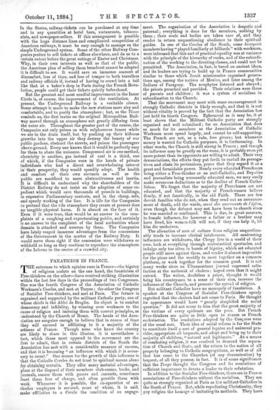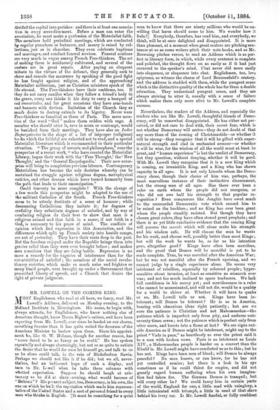FANATICISM IN FRANCE. T HE extremes to which opinion runs in
France—the bigotry of religious zealots on the one hand, the fanaticism of Free-thinkers on the other—have received striking illustration within the last few days in the proceedings of two Congresses. One was the fourth Congress of the Association of Catholic Workmen's Gerdes, and met at Troyes' the other the Congress of Socialist Free-thinkers, and met at Paris. The former is organised and supported by the militant Catholic party, one of whose chiefs is the Abb.i de Broglie. Its object is to combat democracy and infidelity, by winning over workmen to the cause of religion and imbuing them with correct principles, as understood by the Church of Rome. The heads of the Asso- ciation are sanguine enough to believe that in course of time they will succeed in affiliating to it a majority of the artisans of France. Though none who know the country. are likely to share in this illusion, it is nevertheless a fact, which those most opposed to the movement are the first to admit, that in certain districts of the South the Association has met with a considerable measure of success, and that it is becoming "an influence with which it is neces- sary to count." One reason for the growth of this influence is that the Catholic Cercles do not trust to spiritual means alone for obtaining recruits. They offer many material advantages, place at the disposal of their members club-rooms, books, and journals, amuse them with games and concerts, sometimes feast them free of charge, and often provide them with work. Whenever it is possible, the co-operation of or- thodox employers is secured, some of whom, it is said, make affiliation to a Cercle the condition of an engage- ment. The organisation of the Association is despotic and paternal ; everything is done for the members, nothing by them ; their souls and bodies are taken care of, and they render in return unquestioning obedience to their spiritual guides. In one of the Cercles of the South, some bourgeois members having "played familiarly at billiards" with workmen, were informed that this sort of practical equality was at variance with the principle of the hierarchy of ranks, and of the subordi- nation of the working to the directing classes, and could not be permitted. The Association, in fact, is based on ancient ideas, and its leaders are trying to build up in France communities similar to those which Jesuit missionaries organised genera- tions ago, among the natives of Mexico, and later among the Indians of Paraguay. The neophytes listened and obeyed ; the priests preached and provided. Their relations were those of parents and children ; it was a system of socialism in subordination to the Church.
That the movement may meet with some encouragement in strongly Catholic districts is likely enough, and that it is not without vitality is proved by the fact that the Association has just held its fourth Congress. Ephemeral as it may be, it at least shows that the Militant Catholic party are strongly organised and well subsidised ; for an Association that does so much for its .members as the Association of Catholic Workmen must spend largely, and cannot be self-supporting. The French are not, as a rule, free givers ; but whenever money is wanted for Catholic purposes, it is forthcoming. In other words, the Church is still strong in France ; and though its influence may be greatly on the wane, it is probably even yet more potent than its opponents are willing to admit. Their very denunciations, the efforts they put forth to curtail its preroga- tives and abate its pretensions, prove that they regard it as a great and formidable power. Nearly every educated Frenchman being either a Free-thinker or an anti-Catholic, and Deputies and journalists being necessarily educated men, we may easily make erroneous deductions as to the decline of French Catho- licism. We forget that the majority of Frenchmen are not educated, and that the majority of Frenchwomen believe firmly, if not fanatically, in the old Faith. There are few decent families who do not, when they send out an announce- ment of death, add the words, muni des sacrements de l'e'glise, even though the defunct may not have been to church since he was married or confirmed. This is due, in great measure, to female influence, for however a father or a brother may have lived, his women-folk will not, if they can help it, let him die unshriven.
The alienation of men of culture from religion unquestion- ably tends to increase clerical intolerance. All moderating influences are withdrawn, the Clergy live in a world of their own, look at everything through ecclesiastical spectacles, and indulge only too often in bursts of bigotry, which set educated people still more against them, and render it almost impossible . for the pious and the worldly to meet together on a common platform, or work together for the common good. It is not many weeks since an Ultramontane journal expressed satis- faction at the outbreak of cholera ; hoped even that it might extend. The writer, doubtless a priest, thought it would bring his countrymen to a sense of their sins, increase the influence of the Church, and promote the spread of religion. But militant Catholics have no monopoly of fanaticism. A speaker at the Congress of Socialist Free-thinkers openly regretted that the cholera had not come to Paris. He thought its appearance would have "greatly simplified the social question." It did not occur to him that the great majority of the victims of every epidemic are the poor. But French Free-thinkers are quite as little open to reason as French ecclesiastics. The resolutions adopted by the Congress were of the usual sort. Their idea of social reform is for the Stab to constitute itself a sort of general legatee and universal pro- vider, appropriate all bequests, and adopt and bring up to their majority all children, "natural and legitimate." As a means of combating religion, it was resolved to demand the separa- tion of Church and State, and the return to the nation of all propel ty belonging to Catholic congregations, as well as of all that has come to the Churches (of any denomination) by bequest, of all they possess, in fact. It is of some significance that the Temps thought the Congress and its resolutions of sufficient importance to devote a leader to their refutation. In addition to the Socialist Free-thinkers, there are in France associations of Free-thinkers without the socialism. They are quite as strongly organised at Paris as the militant Catholics in the South of France. But., while repudiating Christianity, they pay religion the homage of imitating its methods. They have divided the capital into parishes : and there is at least one associa- tion in every arrondissement. Before a man can enter the association, he must make a profession of the Materialist faith. The members hold periodical meetings, which are conducted br regular preachers or lecturers, and money is raised by col- lections, just as in churches. They even celebrate baptisms and marriages, and conduct funeral services. Funeral orations are very much in vogue among French Free-thinkers. The art of making them is assiduously cultivated, and several of the orators are in great repute. After paying an eloquent tribute to the virtues of the defunct, they generally seek to cheer and console the mourners by speaking of the good fight he has fought against religion, and of the approaching Materialist millenium, just as Christian ministers speak of the life eternal. The Free-thinkers have their emblems, too. If they do not carry candles when they follow a friend's body to the grave, every one thinks it his duty to carry a bouquet of red immortelles, and for great occasions they have arm-bands and banners with devices. Imitation of the Church they so much desire to destroy extends to its bigotry. Never were Free-thinkers so fanatical as those of Paris. The mere men- tion of the word " God " makes them redden with rage. A member who should utter it, save in scorn or contempt, would be banished from their meetings. They have also an Index Expurgatorius in the shape of a list of iniproper (religious) books which the faithful are exhorted not to read, and a special Materialist literature which is recommended to their particular attention. "The group of savants and philosophers," runs the prospectus of a recent work, "who have created the Materialist Library, began their work with the Free Thought,' the New Thought,' and the General Encyclopmdia.' Their new enter- prise will bring to completion previous labours. Contemporary Materialism has become the sole doctrine whereby can be sustained the struggle against religious dogma, metaphysical entities, and other dreams which have turned humanity from the path that leads to their emancipation."
Could travesty be more complete ? With the change of a few words this prospectus might be adapted to the use of the militant Catholics of the South. French Free-thinkers seem to be utterly destitute of a sense of humour ; while denouncing Catholicism they imitate it; for dogmas of credulity they substitute dogmas of unbelief, and by way of combating religion do their best to show that man is a religious animal and that faith in a cause, if not faith in a God, is necessary to his peace of mind. The conflicts of opinion which find expression in this Association, and the differences which split up French society into hostile camps, are not of yesterday. They have their roots deep in the past. But the freedom enjoyed under the Republic brings them into greater relief than they were ever brought before ; and makes men conscious that they are doing battle. Repression is no more a remedy for the vagaries of intolerance than for the eceentricities of unbelief ; the members of the social revolu- tionary societies, which make so much noise and frighten so many timid people, were brought up under a Government that proscribed liberty of speech, and a Church that denies the right of private judgment.



































 Previous page
Previous page